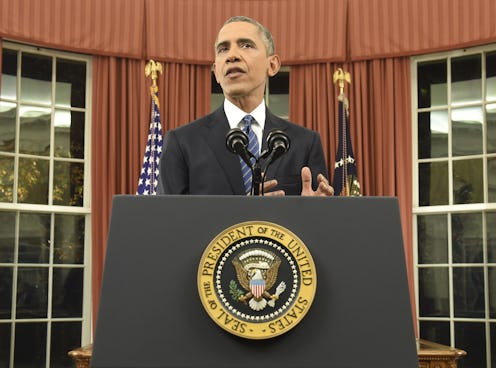News
Did Obama's Oval Office Speech Succeed?
In a high-profile speech on national security, President Obama spoke from the Oval Office on Sunday night to outline his administration's counter-terrorism policies. He presented the address as a response to both the continued growth of ISIS in the Middle East and the recent terrorist attacks in San Bernardino and Paris. Undoubtedly, one of the president's goals was to reassure Americans that the White House is doing everything in its power to keep them safe. Of course, the jury is still out on whether or not he succeeded — but in the short term, the speech contained little in the way of reassurance.
The underlying problem with Obama's Oval Office address is that it simply didn't contain any new information. About half of it focused on the "four steps" that Obama's administration is taking to defeat ISIS, and yet every one of these steps has already been articulated and is already being enacted. For example, Obama said that the U.S. "will continue to provide training and equipment" to sympathetic forces in Iraq and Syria.
The operative phrase is "will continue to" — the U.S. is already doing this, and has been for quite some time. The same goes for his pledge to continue U.S. airstrikes against ISIS, or to cooperate with "friends and allies to stop ISIS' operations." This is all old news, and it's hard to imagine who would derive comfort from it, other than Americans who haven't heard of these policies before but nonetheless agree with them.
Obama dedicated the second half of his speech to steps that "Congress should take right away" to help diminish terrorist threats. This included banning people on no-fly lists from purchasing guns and making it harder to buy assault weapons — both measures that, at least in theory, could have prevented the massacre in San Bernardino. And yet, while these would indeed be substantive policies, it is beyond obvious at this point that Obama's ability to sway Congress is, to put it mildly, extremely limited. That goes double for anything related to gun control.
The rest of the speech focused on "what we should not do." Obama once again reiterated his refusal to launch a ground war in the Iraq or Syria, as he believes this wouldn't eliminate long-term threat of ISIS and could help the group's recruiting strategies. He also articulated his longstanding view that the war on terrorism is not a war on Islam itself.
The most interesting part of Obama's speech was his request for Congress to pass an authorization for military force in Iraq and Syria. That may seem redundant; the U.S. military is, after all, already conducting various operations in those two countries. But there was a political objective to this part of the speech: Obama was calling Congress's bluff.
Many lawmakers have criticized Obama for refusing to send ground troops to fight ISIS in Iraq and Syria. But at the same time, they've never voted to approve such an action. Why wouldn't they? After all, many of these same legislators criticize Obama for going around Congress on important matters. Could it be that they like to talk a tough game but don't actually want to shoulder any of the responsibility for what a ground war might entail?
This was the unspoken assumption in Obama's speech tonight. If lawmakers don't pass, or at least attempt to pass, a war resolution in the near future, Obama's bluff-calling will have been a success. In this sense, the speech was more successful as a counterargument to war hawks than as a reassurance to the American people.
To be fair, it's not clear what a better version of this speech would have looked like if these are the policies Obama is committed to. The majority of Americans disapprove of Obama's approach in dealing with ISIS, yet he's clearly going to stay the course. Is it possible for a president to be reassuring while essentially saying, "I'm going to keep doing what you don't like?" Probably not.
